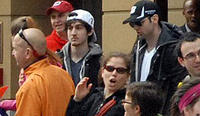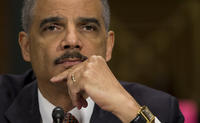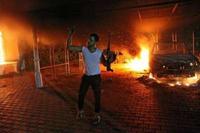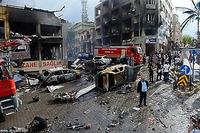-
DHS refuses FOIA requests for the Tsarnaev brothers’ immigration papers

DHS has rejected repeated FOIA requests for the federal immigration records of the Boston Marathon bombing suspects, as well as Immigration and Customs Enforcement’s records on Tamerlan Tsarnaev, saying they are still conducting an investigation.
-
-
Obama administration shifting cybersecurity legislative strategy

The Obama administration’s has shifted its cybersecurity legislative strategy. Rather than emphasize DHS-monitored regulations – an approach which stalled in Congress last summer because of Republican opposition — the administration is focusing on getting Congress to help promote the voluntary adoption by industry of standards being developed by the National Institute of Standards and Technology (NIST) following a February 2013 executive order signed by President Obama.
-
-
Federal budget deficit falling fast – perhaps too fast, some economists say
In each of the last four years the federal budget has exceeded $1 trillion dollars every year. This year, however, the government’s annual deficit is falling faster than anyone thought it would. Some economists say it may be falling too fast. In FY2009-10, the deficit was more than 10 percent of GDP. On present trends, by 2015 the federal budget deficit would be just 2.1 percent of GDP.
-
-
State agency imposes heavy fine on PG&E for San Bruno blast
The California Public Utilities Commission (CPUC) two weeks ago wrapped up its investigation of a 2010 gas pipeline explosion in San Bruno, California, and recommended that Pacific Gas and Electric (PG&E) pay $2.25 billion for its negligence, which led to the blast.
-
-
Nigeria’s president: Islamists have “declared war” on Nigeria; state of emergency imposed
Nigerian president Goodluck Jonathan yesterday announced a state of emergency in northeast Nigeria. In a speech to the nation, Jonathan said that Islamic militants are now in control of large areas, imposing strict Islamic law in dozens of towns and villages. “What we are facing is not just militancy or criminality, but a rebellion and insurgency by terrorist groups which pose a very serious threat to national unity and territorial integrity,” the president said. “These actions amount to a declaration of war” by groups “whose allegiance [is] to different flags than Nigeria’s.”
-
-
A “cauldron of events” has brought the nuclear industry to a halt
Until two years ago, people talked of a nuclear energy renaissance. Now the talk is about nuclear malaise. The Fukushima scare, the emergence of alternative energy sources as a result of fracking, and the lack of action on climate change – which means that limits on fossil fuels are not coming any time soon – have, in the words of one experts, brought the nuclear industry to a halt.
-
-
Oakland wants to write its own gun control laws
The leaders of Oakland, California, say that state gun laws are not suitable for their crime-infested city. They want to write their own gun law, saying it would not ban guns, but would allow the city to have tighter controls on who owns and who is selling them and buying them.
-
-
U.S. secretly obtains AP phone records to identify source of story

In what the AP calls a “massive and unprecedented intrusion” into the news organization’s news work, the U.S. Justice Department secretly gathered two-months-worth of telephone records of the agency’s reporters and editors. The AP says the records listed incoming and outgoing calls to the offices and homes of reporters and editors. The Justice Department began collecting the phone records in order to identify the source or sources of a 7 May 2012 AP story which detailed a secret CIA operation in Yemen to intercept an al Qaeda-sponsored attempt to load an IED onto a U.S.-bound airplane.
-
-
The administration's struggle to define Benghazi attack as “terrorism”
Administration critics on the Hill now focus more of their attention on the changing explanations administration officials have offered in public as to the nature of the attack and the identity of the perpetrators. Yesterday, President Obama said the he used the term “terrorism” early on, and that he dispatched a senior official to brief lawmakers in the issue. He is right – up to a point: On 12 September Obama did describe the attack as an “act of terror,” and on 19 September counterterrorism director Matt Olsen used the term in response to a senator’s question, but otherwise, until 20 September, all high-level administration officials, including Obama, declined to attribute the attack to terrorists.
-
-
Saudi man arrested at Detroit airport with two pressure cookers in luggage

Hussain Al Khawahir, a Saudi citizen, was arrested Saturday at Detroit Metropolitan Airport after CBP agents found two pressure cookers in his luggage, and a page missing from his Saudi passport. He said he brought them for his nephew, a university student, because his nephew liked to cook lamb in a pressure cooker and U.S. pressure cookers were just not good enough.
-
-
Obama, Democrats walking a tight rope on gay couples and immigration reform
Gay rights organizations are putting pressure on President Obama to offer more support to changing the bipartisan immigration bill so that the foreign partners of gay Americans would have the same rights as the foreign partners of straight Americans. Obama and many Democratic lawmakers are caught between the wishes of an important constituency in the Democratic Party, and a desire to see the immigration overhaul measure passed. Having gay couples enjoy the same rights as straight couples may threaten the bill’s chances of passing.
-
-
IRS targets non-profits perceived to be critical of the government
In the wake of the Supreme Court’s Citizens United ruling, the number of groups applying to the IRS for a tax-exempt status has more than doubled. The IRS inspector general, doing an audit of agency documents relating to such applications, discovered the agency was paying extra attention to groups with the words “tea party” or “patriot” in their names, and to groups which appeared to be critical of the government. Senator Susan Collins (R-Maine) called the situation “absolutely chilling.”
-
-
The two sides in the gun control debate are gearing up for Round 2
A few weeks ago, when the Senate was considering legislation to expand background checks for gun buyers and other gun-control measures, gun-rights advocate successfully organized and campaigned at the grass-root level, exerting pressure on enough wavering Senators, including four Democrats from Red stated who face re-election in 2014. Now, as the Senate majority leader is getting set to introduce the gun-control measures again, supporters of gun control legislation are trying to emulate the grass-root mobilization performance of gun-rights advocates.
-
-
Lawmakers want Benghazi ARB examined

The Department of State appointed an Accountability Review Board (ARB), headed by Ambassador Thomas Pickering and Adm. Mike Mullen, to look into the Department’s performance before and during the Benghazi attack. The ABR submitted its conclusions in mid-December 2012. The ARB offered unsparing criticism of different aspects the State Department’s decision making in the months before the attack regarding the security of the Benghazi compound, but it did not find anything rising to the level of criminality or gross negligence in the department’s policies toward security in Benghazi. The chairman of the House Foreign Affairs Committee wants the State Department’s Inspector General to examine the way the Benghazi ARB conducted its investigation.
-
-
Pro-Assad group attacks Turkish border town, killing 46

A Turkish group affiliated with a Syrian Alawite militia and operating on orders of Syrian intelligence, carried out a suicide attack Saturday in the Turkish city of Reyhanli, killing forty-six people. More than fifty people are still being treated in local hospitals. Reyhanli is an entry point for refugees fleeing violence in Syria. The attack will increase pressure on Turkey to become more involved in the Syrian conflict.
-
More headlines
The long view
Kinetic Operations Bring Authoritarian Violence to Democratic Streets
Foreign interference in democracies has a multifaceted toolkit. In addition to information manipulation, the tactical tools authoritarian actors use to undermine democracy include cyber operations, economic coercion, malign finance, and civil society subversion.
Patriots’ Day: How Far-Right Groups Hijack History and Patriotic Symbols to Advance Their Cause, According to an Expert on Extremism
Extremist groups have attempted to change the meaning of freedom and liberty embedded in Patriots’ Day — a commemoration of the battles of Lexington and Concord – to serve their far-right rhetoric, recruitment, and radicalization. Understanding how patriotic symbols can be exploited offers important insights into how historical narratives may be manipulated, potentially leading to harmful consequences in American society.
Trump Aims to Shut Down State Climate Policies
President Donald Trump has launched an all-out legal attack on states’ authority to set climate change policy. Climate-focused state leaders say his administration has no legal basis to unravel their efforts.
Vaccine Integrity Project Says New FDA Rules on COVID-19 Vaccines Show Lack of Consensus, Clarity
Sidestepping both the FDA’s own Vaccines and Related Biological Products Advisory Committee and the CDC’s Advisory Committee on Immunization Practices (ACIP), two Trump-appointed FDA leaders penned an opinion piece in the New England Journal of Medicine to announce new, more restrictive, COVID-19 vaccine recommendations. Critics say that not seeking broad input into the new policy, which would help FDA to understand its implications, feasibility, and the potential for unintended consequences, amounts to policy by proclamation.
Twenty-One Things That Are True in Los Angeles
To understand the dangers inherent in deploying the California National Guard – over the strenuous objections of the California governor – and active-duty Marines to deal with anti-ICE protesters, we should remind ourselves of a few elementary truths, writes Benjamin Wittes. Among these truths: “Not all lawful exercises of authority are wise, prudent, or smart”; “Not all crimes require a federal response”; “Avoiding tragic and unnecessary confrontations is generally desirable”; and “It is thus unwise, imprudent, and stupid to take actions for performative reasons that one might reasonably anticipate would increase the risks of such confrontations.”
Luigi Mangione and the Making of a ‘Terrorist’
Discretion is crucial to the American tradition of criminal law, Jacob Ware and Ania Zolyniak write, noting that “lawmakers enact broader statutes to empower prosecutors to pursue justice while entrusting that they will stay within the confines of their authority and screen out the inevitable “absurd” cases that may arise.” Discretion is also vital to maintaining the legitimacy of the legal system. In the prosecution’s case against Luigi Mangione, they charge, “That discretion was abused.”
